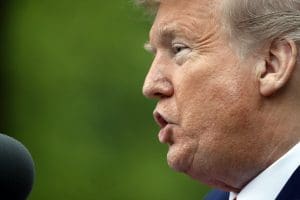Trump stops funding World Health Organization — in the middle of a pandemic
Trump has been scapegoating the WHO to deflect criticism of his own administration’s response to the COVID-19 pandemic.

Donald Trump on Tuesday said he’s halting U.S. funding to the World Health Organization amid the coronavirus pandemic, falsely accusing the organization of not being transparent about the spread of the novel coronavirus.
“Today I’m instructing my administration to halt funding of the World Health Organization while a review is conducted to assess the World Health Organization’s role in severely mismanaging and covering up the spread of the coronavirus,” Trump said at his daily coronavirus task force briefing at the White House.
The WHO did not cover up the spread of the novel coronavirus.
Rather, the organization was warning about the virus for months and declared a public health emergency on Jan. 30.
While the WHO was sounding the alarm about the spread of COVID-19, Trump himself was downplaying the virus, with both the Washington Post and New York Times reporting that he ignored warnings from his own officials that he should take action to stop the spread in the United States.
Trump on Tuesday went on to accuse the WHO of being too trusting of China, saying the group “willingly took China’s assurances at face value … and defended the actions of the Chinese government, even praising China for its so-called ‘transparency’ — I don’t think so.”
However, Trump himself praised China’s transparency about the virus.
“China has been working very hard to contain the Coronavirus. The United States greatly appreciates their efforts and transparency,” Trump said in a Jan. 24 tweet. “It will all work out well. In particular, on behalf of the American People, I want to thank President Xi!”
Trump has been scapegoating the WHO to deflect criticism of his own administration’s response to the COVID-19 pandemic, which has infected more than 600,000 in the United States and led to nearly 26,000 deaths since Feb. 29, according to the Washington Post.
Last week, Trump said he was considering cutting funding to the WHO and falsely claimed that the United States gives “a majority of the money that they get.” According to the WHO’s reporting, the United States government funded 14.67% of the agency’s 2018-2019 budget.
And the WHO has fired back at some of Trump’s calls for reopening the United States for business, saying that ending social distancing measures too early is the “last thing any country needs.”
Trump first called for a freeze on U.S. funding of the organization — which works to stop the spread of global pandemics such as Ebola, H1N1, and now COVID-19 — on April 7.
In response, WHO Director-General Dr. Tedros Adhanom Ghebreyesus said that politicizing the pandemic would lead to “many more body bags.”
The head of the United Nations also criticized Trump’s decision to freeze WHO funding in the middle of a global health crisis.
“Now is a time for unity in the global battle to push the COVID-19 pandemic into reverse, not a time to cut the resources of the [WHO], which is spearheading and coordinating the global body’s efforts,” UN Secretary-General António Guterres said in a statement on Tuesday.
Published with permission of The American Independent Foundation.
Recommended

Ohio doctors fear effects of emergency abortion care case set to go before U.S. Supreme Court
A federal law that allows emergency departments to treat patients without regard to their ability to pay will be under U.S. Supreme Court scrutiny this week, and Ohio doctors are concerned about the case’s local impact on emergency abortion care.
By Susan Tebben, Ohio Capital Journal - April 23, 2024
House GOP votes to end flu, whooping cough vaccine rules for foster and adoptive families
A bill to eliminate flu and whooping cough vaccine requirements for adoptive and foster families caring for babies and medically fragile kids is heading to the governor’s desk.
By Anita Wadhwani, Tennessee Lookout - March 26, 2024
U.S. House Speaker Johnson says IVF should be protected — just not by Congress
U.S. House Speaker Mike Johnson said Thursday that it’s up to states and not Congress to preserve access to in vitro fertilization, weighing in on a growing national debate and campaign issue.
By Jennifer Shutt, States Newsroom - March 14, 2024









































































